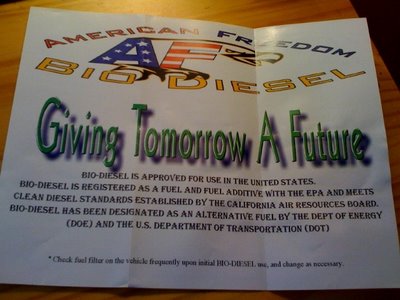"I live in the SouthEast US and used to buy biodiesel (B100) made from poultry fat from processing plants in North Georgia. It was consistently $.15/gallon cheaper than diesel. Unfortunately, companies from China now purchase every bit of rendered poultry fat and pay a processor in Rome, GA to make it into biodiesel and ship it by the container load to China. Now I have to pay a premium for biodiesel produced from virgin soy oil. This one disadvantage of letting the free market set the price and availability of fuel."
News and information about Biodiesel & alternative fuels.
2008/08/25
Chinese Processors
2008/07/30
Why is biodiesel so expensive in California?
Biodiesel will become cheaper than petroleum diesel but it won't be because the price of biodiesel goes down. This change will occur because the price of petroleum will continue to rise. A good place to start to understand some of the factors that affect the price per gallon of biodiesel is to ask where does your fuel come from? Was it locally produced or did it travel across the country or around the world by train, truck, or ship? What is your fuel made from: virgin soy bean, corn, canola, tropical palm oil, rendered animal tallow or waste vegetable oil and inedible kitchen grease?Thanks Ben!
The base cost of each gallon of biodiesel is the sum of raw materials costs (vegetable or animal oil feedstock, methanol, catalyst, heat), market influences of supply and demand, and taxes. Additional items that affect the final cost are transportation, distribution, permits, state regulation, and consistent quality assurance of the fuel.
2008/05/27
NYTimes on 2009 Diesels
A 19th-century invention by Rudolf Diesel, the diesel engine has always been known for outstanding fuel efficiency, with better mileage (by 25 percent to 40 percent) than gasoline. But the kerosenelike fuel and the engines that burn it were dirty, noisy, dawdling and even deadly, linked to increased risk of cancer and respiratory disease.
That has all changed, in part because of cleaner-burning fuel — its 2006 rollout had been mandated in 2000 by the Clinton administration — that has 97 percent less of the sulfur responsible for diesel engines’ sooty particulates.
The low-sulfur fuel, hailed by the Environmental Protection Agency as a historic advance, has opened the door to sophisticated emissions controls that let diesel engines meet the strict pollution standards of California. Those rules, the world’s most stringent by far, require 2009-model diesels to be as green as gasoline or even hybrid models.
2008/05/05
New Bay Area Station: San Mateo's Autopia
- Location: 1025 S. Railroad Ave, San Mateo, CA (north of 92, near Delaware & 9th Ave)
- Price: $4.74/gallon (as of 2008/05/05)
- Type: B99, ASTM-certified
- Source: local, recycled oil
"The simple, airy warehouse on South Railroad Avenue welcomes visitors with bright yellow floor and ample parking just off the Caltrain tracks, next to a row of car-related businesses. Autopia will eventually offer concessions for sale, mostly organic goodies from local vendors."
2008/04/19
Biodiesel Price Increases
- virgin soybean oil's price has tripled in the past year
- lots of biodiesel plants have ceased production until prices fall
Dear LC Biofuels BUG Members,
Thanks for all the emails and phone calls voicing your concerns over the ever increasing price of biodiesel. The price increase is as frustrating for us as it is all of you, if not more. Though it seems the price of biodiesel is tied to petroleum diesel there are many other factors that drive the price up more significantly. Feedstock prices, production costs, transportation, and the weakening of the dollar all contribute to the high price of biodiesel.
The primary culprit is the high price of feedstock used to make the fuel. Our prices are dictated mostly by the CBOT (Chicago Board of Trade) and what soybean oil, tallow, rendered products and all the other feedstocks used in biodiesel production are being traded for. Over the past year we have seen the price of soybean oil triple. Two weeks ago, it reached a high of $0.70 per lb, or $5.25 per gallon to the producer. Add another dollar to that for production and shipping and you realize what virgin soy biodiesel would go for. The reason soy prices have increased the way they have is the U.S. is exporting the oil to other countries at a premium. With the low cost of the dollar, countries like China, who produce thousands of products that require soy oil in the ingredients, are happy to pay a premium for the oil since the dollar is so cheap. The traders are happy to drive the price up to pad their pockets as well.
This price increase has caused many biodiesel plants to cease production until prices come back down. With plants going off line every month, we have seen prices go up and up to the distributor. We tried to hold off on raising our prices by thinking the price increase was short term, but we now realize it is not. As soon as our costs begin to decrease you will certainly see it at the pump.
To help ease the pain of increasing costs we are offering $.05 off the posted price at the pump for prepayments of $200.00 or more payable by check or money order to LC Biofuels, LLC.
We value our customers and are striving to make biodiesel a mainstream product. We appreciate all feedback and support. Please give us a call with any other questions or concerns. Thanks again.
Pollution FUD
"After residents of the Riverbend Farms subdivision noticed that an oily, fetid substance had begun fouling the Black Warrior River, which runs through their backyards, Mark Storey, a retired petroleum plant worker, hopped into his boat to follow it upstream to its source.It's unfortunate that some of these biodiesel producers aren't taking more precautions with their sanitation and waste runoff. It's pretty embarrassing, given that biofuels are supposed to be better for the environment and all.
It turned out to be an old chemical factory that had been converted into Alabama’s first biodiesel plant, a refinery that intended to turn soybean oil into earth-friendly fuel..."
2008/03/06
LC Biofuels response to the FUD
Due to the recent concern over the sustainability of biofuels, we would like to address our Biodiesel User Group Members about LC Biofuels position on sustainable biodiesel.
Our premium quality biodiesel is made in the US from a blend of 80% American grown soy bean oil and 20% recycled oils. This blend yields the highest quality biodiesel available with recycled feedstock without sacrificing low cold flow properties. We pledge to never source foreign grown feedstock's such as palm oil and South American soy that is unsustainable and environmentally destructive. We also pledge to use the most sustainable and locally produced biodiesel as it becomes available. The biodiesel industry is still in its infancy, however there are many alternative feedstock's and production companies that will be available to us in the near future.
LC Biofuels, LLC position on Sustainable Biodiesel reflects that of the National Biodiesel Board, of which we have been a Member since 2005.
1. LC Biofuels only sources biodiesel from a blend of 80% U.S. grown Soy and 20% recycled oils.
2. We oppose the use of non-sustainable agriculture practices worldwide in biodiesel production.
3. We support efforts to ensure that biodiesel produced and sold in the U.S. comes from sustainable resources.
4. In the United States , more than 80% of estimated 2007 biodiesel production came from soybean oil. The rest was divided among other feedstock's such as recycled cooking oil, fats, and vegetable oils from other oilseed crops.
5. The U.S. Department of Agriculture (USDA) reports that U.S. acreage for crop production has not increased since 1959. Major land use changes are not expected due to Biofuels.
6. The U.S. is the largest exporter of soybeans in the world, making the importation of soybeans from countries with non-sustainable agricultural practices less likely. Other nations have already been increasing soybean production for decades.
7. According to a USDA/DOE life cycle study, soy-based biodiesel has a 78% carbon dioxide reduction. This takes into account the planting and harvesting of the soybeans, producing the fuel and delivering it to the pump. A 2007 update to the study found that for every unit of fossil energy it takes to make biodiesel, 3.5 units of energy are gained.
8. According to U.S. Census data, the country currently has the equivalent of more than 400 million gallons of soybean oil sitting in inventory. The 2009 RFS goal is the use of 500 million gallons of biomass-based diesel, which includes biodiesel. Soybean oil only represents half of the available domestic raw materials for biodiesel available in the U.S.
Additionally, the NBB has feedstock development programs in place to further increase the efficiency and diversity of the raw materials that are used for biodiesel production. These initiatives have the potential to recycle commercial and agricultural wastes, bring sustainable agriculture to non-productive lands, increase crop yields, and further lower pesticide and fertilizer applications. Arid variety crops, algae, waste greases, and other feedstock's on the horizon have great potential to expand available material for biodiesel in a sustainable manner.
For more information please contact LC Biofuels, LLC at 510-232-0416 or visit www.lcbiofuels.com or www.biodiesel.org
2008/02/18
And More FUD
"Almost all biofuels used today cause more greenhouse gas emissions than conventional fuels if the full emissions costs of producing these “green” fuels are taken into account, two studies being published Thursday have concluded..."There's also been some discussion about the issue in the comments of another post here on the biodiesel blog.
“When you take this into account, most of the biofuel that people are using or planning to use would probably increase greenhouse gasses substantially,” said Timothy Searchinger, lead author of one of the studies and a researcher in environment and economics at Princeton University. “Previously there’s been an accounting error: land use change has been left out of prior analysis.”
Virgin Air Biofuel
2008/02/16
2008/02/14
American Freedom Biodiesel






